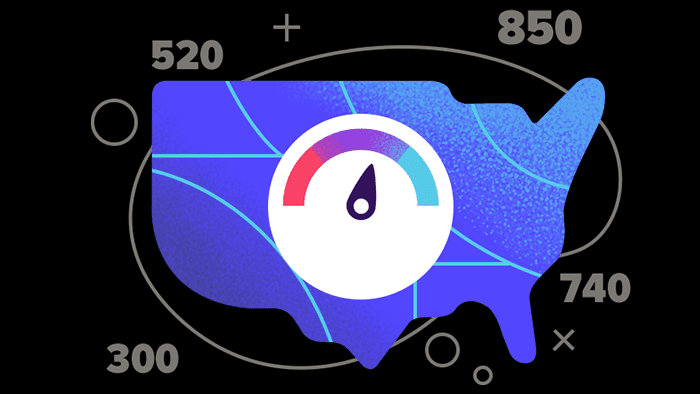
Your credit score significantly impacts your financial life, from qualifying for credit cards and home loans to even renting apartments. The ultimate goal is to reach an excellent credit score of 750 to 850, and residents in some states are already closer to that goal than others.
Residents of Minnesota have the highest average credit score, at 725, according to a new report by the personal-finance website WalletHub. New Hampshire, Vermont, Massachusetts, and Wisconsin residents had the next highest average scores, while residents of Oklahoma, Texas, Alabama, Louisiana, and Mississippi had the lowest average credit scores. The report compared the average credit scores of residents in each of the 50 states as of October 2023, based on TransUnion data.
“It’s not very surprising that Minnesotans have the highest average credit score at 725, considering the state’s stable economy, good job market, and relatively low household debt,” said Cassandra Happe, WalletHub analyst. “New Hampshire came in a close second with an average credit score of 722, while Vermont had the third-highest average score at 721.”
| Highest Credit Scores | Lowest Credit Scores |
| 1. Minnesota (725.3) | 41. Kentucky (687.2) |
| 2. New Hampshire (721.6) | 42. South Carolina (687.1) |
| 3. Vermont (720.7) | 43. Nevada (686.2) |
| 4. Massachusetts (717.8) | 44. Georgia (681.8) |
| 5. Wisconsin (717.5) | 45. Arkansas (681.6) |
| 6. North Dakota (717.4) | 46. Oklahoma (681.5) |
| 7. Washington (717.3) | 47. Texas (679.8) |
| 8. South Dakota (716.9) | 48. Alabama (679.6) |
| 9. Hawaii (715.4) | 49. Louisiana (675.9) |
| 10. Montana (715.3) | 50. Mississippi (672.0) |
WalletHub’s study found that 31 states had an average credit score above 700, which most lenders consider “good” credit. In addition, there are 21 states where more than half of the residents have a credit score of 720 or above. “It is encouraging to see these positive credit scores, despite the challenges that many consumers are facing with the current economy and inflation, ” noted Happe. “These high scores are a sign that even though many Americans are struggling with financial obstacles, they are still prioritizing their debts.”
Income and debt may influence a consumer’s ability to get credit and repay it on time, yet payment history is only one piece of the credit score puzzle. Your credit score is based on many factors. Not only does your payment history impact your credit score, but so does the length of your credit history, the types of credit you have, any derogatory marks such as bankruptcies, and your credit utilization. When consumers are in a financial bind, it can be easy to max out credit cards to make ends meet. Experts recommend keeping your balances on credit cards below 30% to avoid any negative impact on your credit score.
Tips for Improving Your Credit Score
- Check Your Credit Report: Every year, you are entitled to a free copy of your credit report from each credit bureau. You can also utilize credit monitoring websites such as WalletHub, to stay on top of changes in your report throughout the year. If you identify a mistake on your credit report, you’ll need to follow the process for disputing credit report errors, which is one of the easiest ways to improve your credit score and doesn’t take much time.
- Be Cautious with New Credit Applications: Applying for a credit card or loan can lead to a slight dip in your credit score, especially when you apply repeatedly within a short period. These inquiries can give lenders the impression that you are desperate to borrow and may need more money to pay them if your application is approved. Research and compare your options to find the best terms with the highest approval odds for your financial situation and limit your applications to just the top offers.
- Get a Secured Credit Card: If you are struggling with getting approved for a “regular” credit card, open a secured credit card to help build your credit history. Secured credit cards are easier to get than most other credit cards since they require a refundable security deposit, the amount of which usually acts as your spending limit. Secured cards are treated just like any other credit card on your credit report, too.
- Maintain Low Account Balances: One factor that impacts your credit score is credit utilization, which is determined by comparing the balance listed on your monthly statement against your credit limit. A higher ratio hurts your credit score, indicating you are stretched thin financially. Try maintaining a credit utilization ratio below 30% on each credit card. And if you want to maximize your credit score, aim for less than 10%.
- Keep Unused Accounts Open: Your credit report will be used by many decision-makers, such as lenders, landlords, and employers, to determine whether you are trustworthy. They are more likely to trust an applicant with a more extended history of responsible money management, so keeping these accounts open will extend that positive history. You should not, however, keep an unused account open if you have to pay an annual fee for it. You should close accounts costing you money and use the savings to pay down other debts or build an emergency fund.





























































